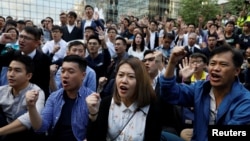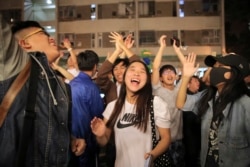The people of Hong Kong gave a big victory to pro-democracy forces in local elections over the weekend. Their victory effectively puts pressure on the city’s leader and China’s government for change.
On Sunday, voters in the semi-autonomous territory, turned out in record numbers to vote for opposition candidates. Voters elected opposition candidates to nearly 400 of the 452 seats in district councils. In the last election, four years ago, the opposition won just 100 seats on the councils.
Hong Kong voters cannot directly elect the city’s leader. They can only elect half of the legislature. The district councils deal with local issues such as transportation. Their members form a very small part of the election committee for Hong Kong Chief Executive Carrie Lam.
Ma Ngok teaches political science at the Chinese University of Hong Kong. He said, “Most people think the extra one million voters came out to send a political message to the government, that they still support the protesters and they’re dissatisfied with the government.”
“The government and the pro-Beijing camp have always claimed they have public support,” Ma told the Reuters news agency. “But now … this is a big slap in the face because the public has showed their real position in record numbers.”
On Monday, Lam said in a statement she respected the election results and wished “the peaceful, safe and orderly situation to continue.” She added her government “will listen to the views of the public with an open mind and with serious reflection.”
Shi Yinhong is an international relations expert at Renmin University of China. He said, “I would suppose the central government [China] must be aware that the majority of Hong Kong’s people are dissatisfied with Carrie Lam, her government and the police, but there is no other real option.”
Some observers said Lam would now face more pressure to answer the demands of pro-democracy protesters. They want democratic reforms and an independent investigation into reports of police violence against the demonstrators.
China’s central government has continued its support for Lam and refused to give in to protesters’ demands. The state-operated Xinhua news agency announced the completion of the Hong Kong vote. But it did not say which side had won.
A Foreign Ministry spokesman said that China “firmly supports” Lam’s leadership of the territory. He added that Hong Kong’s most urgent task was to re-establish order and stop the violence. The Chinese military has several thousand troops in Hong Kong but so far has avoided deploying them against the protesters.
Hong Kong returned to Chinese rule in 1997 with a promise of a high degree of autonomy. The latest protests started over a now-withdrawn bill that would have let Hong Kong officials send suspects to mainland China for trial. The protesters then called for more democratic reforms in a direct test to Chinese rule.
The violence was fueled, in part, by the death of a protester after a fall, and the shooting of another by a police officer.
In the days leading up to the vote, anti-government protesters clashed with riot police. Some protesters had barricaded themselves inside universities.
The election temporarily stopped the violence. With the victory, Carrie Lam’s critics have not said if they will return to the streets.
I'm Jonathan Evans.
The Associated Press and the Reuters news agency reported this story. Hai Do adapted this story for VOA Learning English. George Grow was the editor.
Write to us in the Comments Section or on our Facebook page.
________________________________________________________________
Words in This Story
semi-autonomous – adj. having some of the power or right to govern itself
slap in the face - idiom, a surprising act that offends or insults someone
reflection – n. careful thought about something
option – n. a choice or possibility
barricade – v. to block (something) so that people cannot enter or leave






